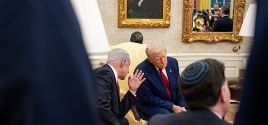266 excuses the Government has to raid your homeBy JAMES SLACKThe Daily Mail Apr. 23, 2007 |
Popular 
NYT: Trump Ended War With Houthis After They Shot Down U.S. Drones, Nearly Hit Fighter Jets

Ben Shapiro, Mark Levin and Laura Loomer Warn of Foreign Influence... From Qatar

Trump Advisor to Washington Post: 'In MAGA, We Are Not Bibi Fans'

Trump Cut Off Contact With Netanyahu Over 'Manipulation' Concerns, Israeli Reporter Claims

Trump Praises Houthis' 'Bravery'
  Suspicious seals: One of the bizarre excuses to raid your home Suspicious seals: One of the bizarre excuses to raid your homePerhaps you are keeping a hive full of foreign bees in the cupboard under the stairs. Or maybe there's a secret pool in the back garden where seals are breeding so quickly that a cull is necessary to control them. Such events might seem inconceivable. Yet suspicion that either is taking place would be enough excuse for a state official to smash his way into your home. An astonishing 266 laws exist giving powers not just to police but to an extensive range of public officials to enter private residences – by force if necessary – according to the Centre for Policy Studies. The centre-right think tank says its findings are proof that an Englishman's home is no longer his castle. They will also heighten fears that the country is drifting towards a "Big Brother is watching you" surveillance state. Harry Snook, author of the CPS pamphlet, said the bulk of the powers had been created by Parliament over the last two decades. Some are indisputably needed, such as seizing items which could be used for committing a terrorist attack, or making an arrest. But many are obscure, originating from the likes of the Scrap Metal Dealers Act 1964, the Conservation of Seals Act 1970, and the Bees Act of 1980. The circumstances where officials can enter a private home include to carry out a fact-finding mission for landmines, search for material or tools related to nuclear explosions, measure rooms to regulate overcrowding or check for unlicensed scrap metal dealing. The Conservation of Seals Act allows the Secretary of State for Agriculture immediate entry to a property, to check if there are any seals living inside which may be "damaging fish stocks". Refusing entry carries a £2,500 fine. The 1952 Hypnotism Act allows inspectors inside to check if any entertainment taking place breaks the law covering hypnotism stage acts. Refusing entry to an official who wants to check for foreign bees hidden in the house, which are banned in the UK under the Bees Act 1980, carries a £1,000 fine. The 1979 Customs and Excise Management Act 1979 allows customs officers, a police officer or a coastguard to enter any property by force if it is suspected the householder is giving a signal to smugglers that the coast is clear by, for example, shining a light. Mr Snook said: "The law of entry as it currently stands is failing citizens. It fails to protect them from overzealous officials, provide them with simple and consistent rules on when someone can enter their home, and ensure that such incidents are properly recorded. "Every power of entry is a disruption of a citizen's right to privacy in his or her home in favour of the interests of the State. "With 266 powers in force and more contemplated, it is high time for Parliament to put its own house in order – and give its citizens security in theirs." In a further "Big Brother" development plain-clothes snoopers are being paid £30,000 a year to track down homeowners who put their rubbish out at the wrong time of the week or in the wrong place. The "envirocrime" officers are employed to enforce environmental regulations and have the power to fine residents who "offend". Ealing Council in West London is spending nearly £150,000 on recruiting and employing four new enforcement patrollers to add to its 23- strong team monitoring "waste disposal" regulations. |



